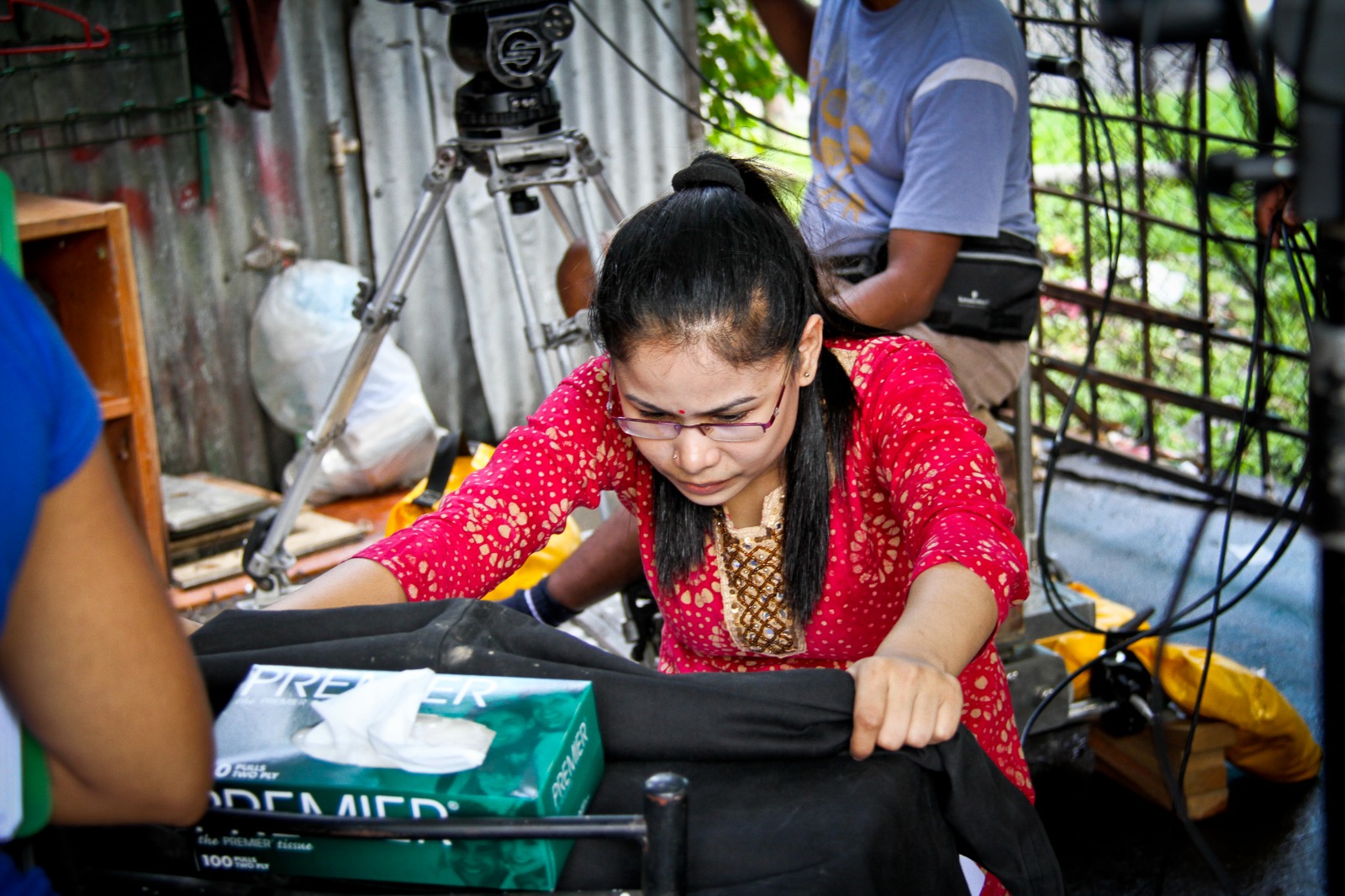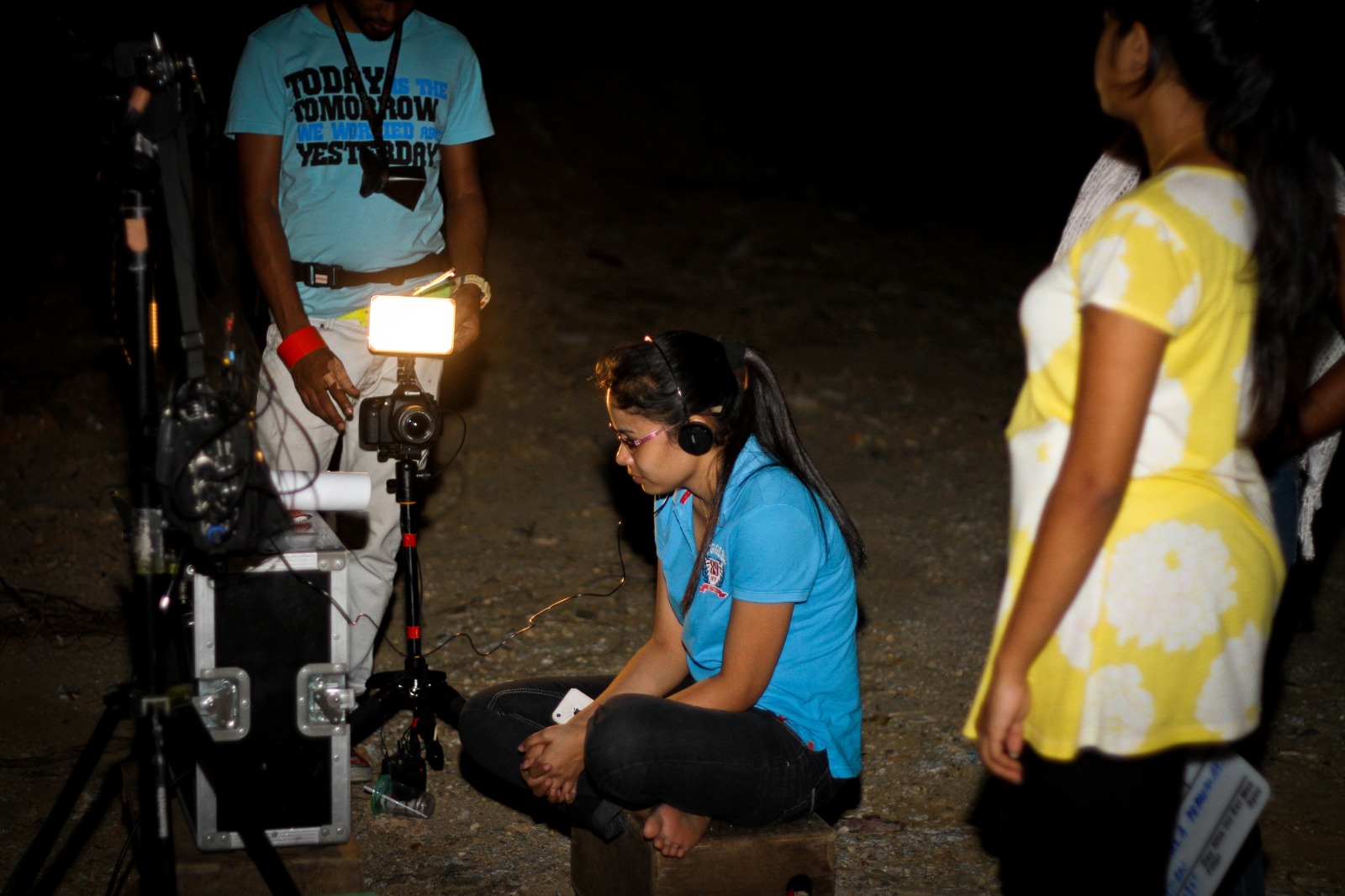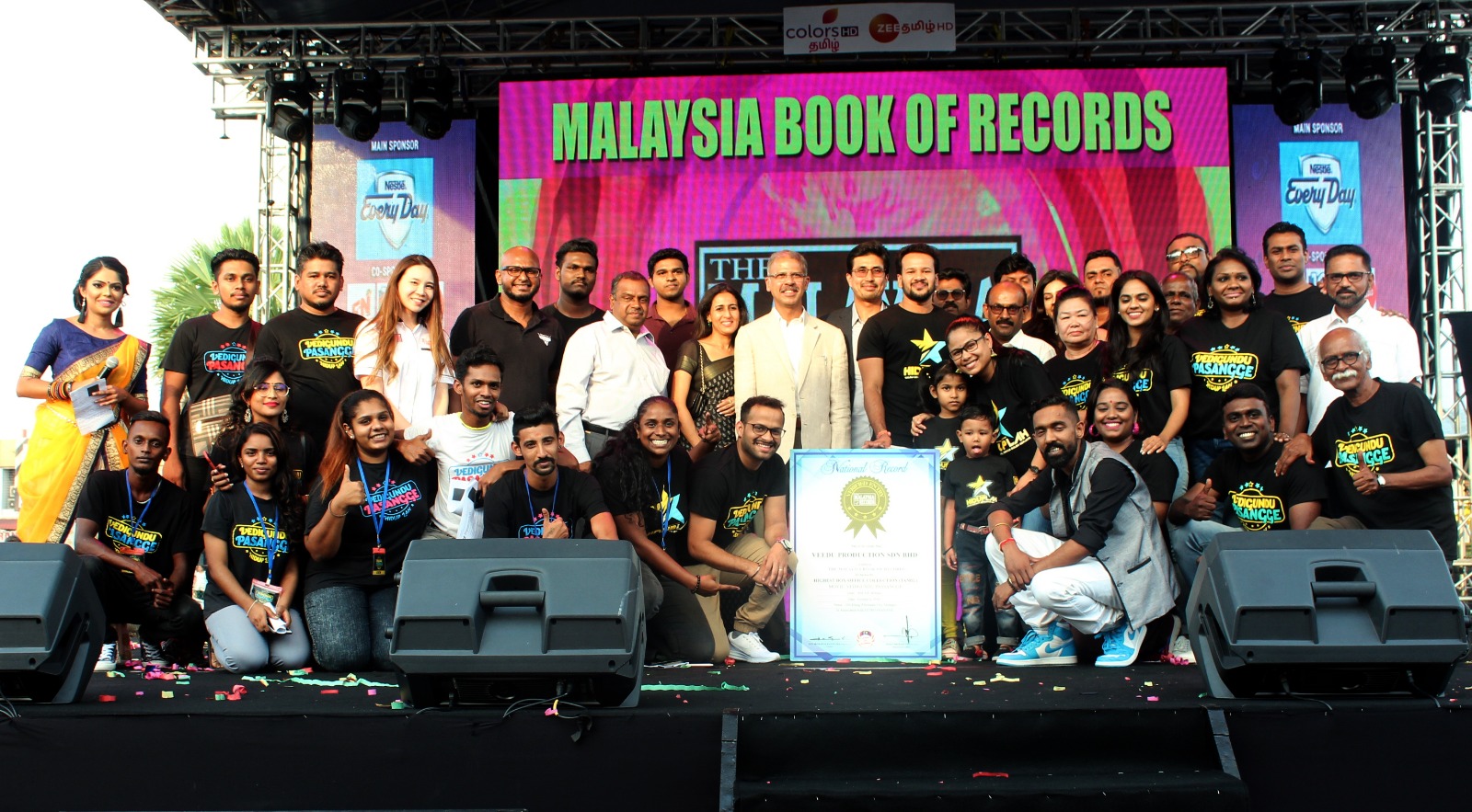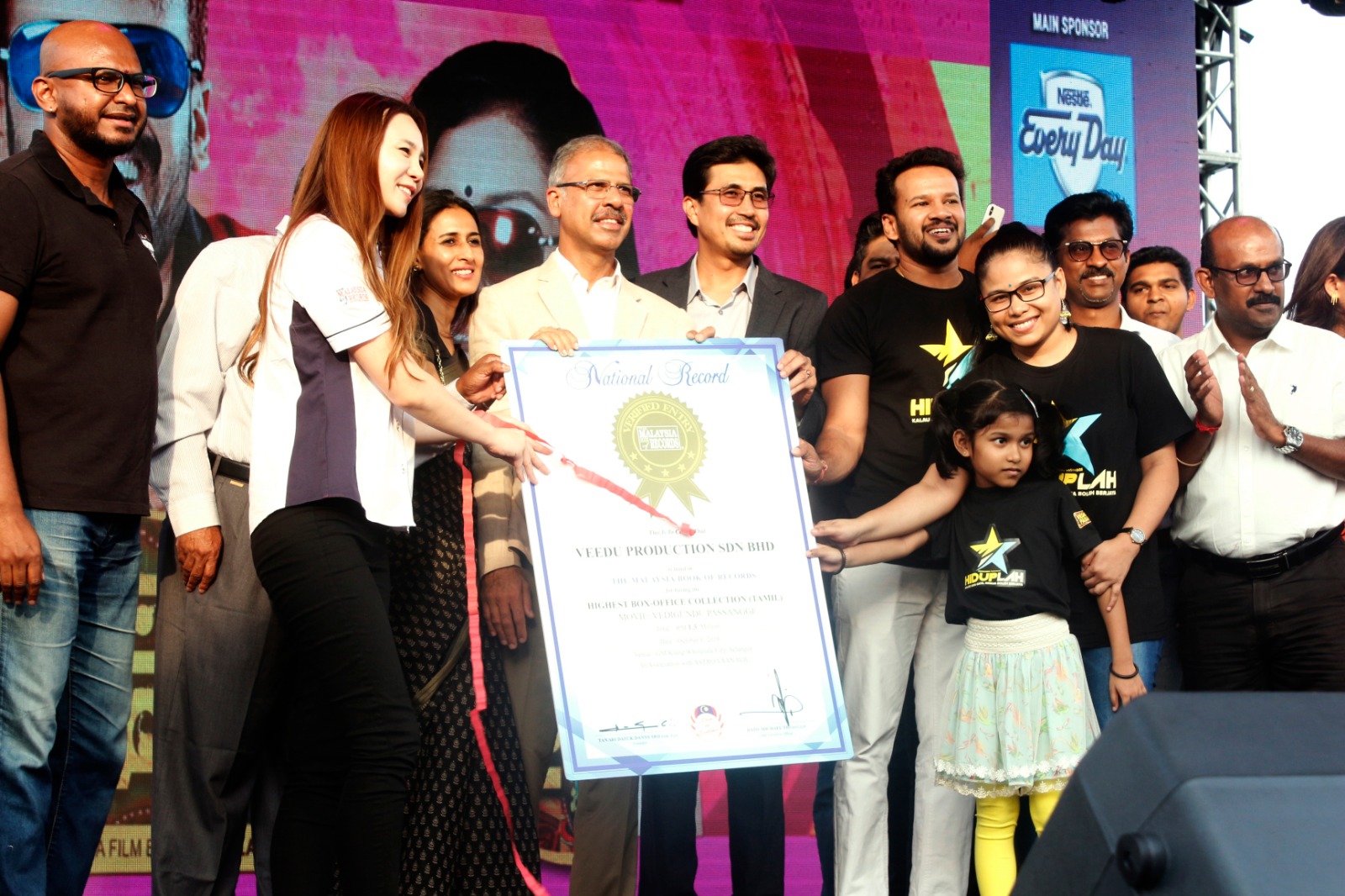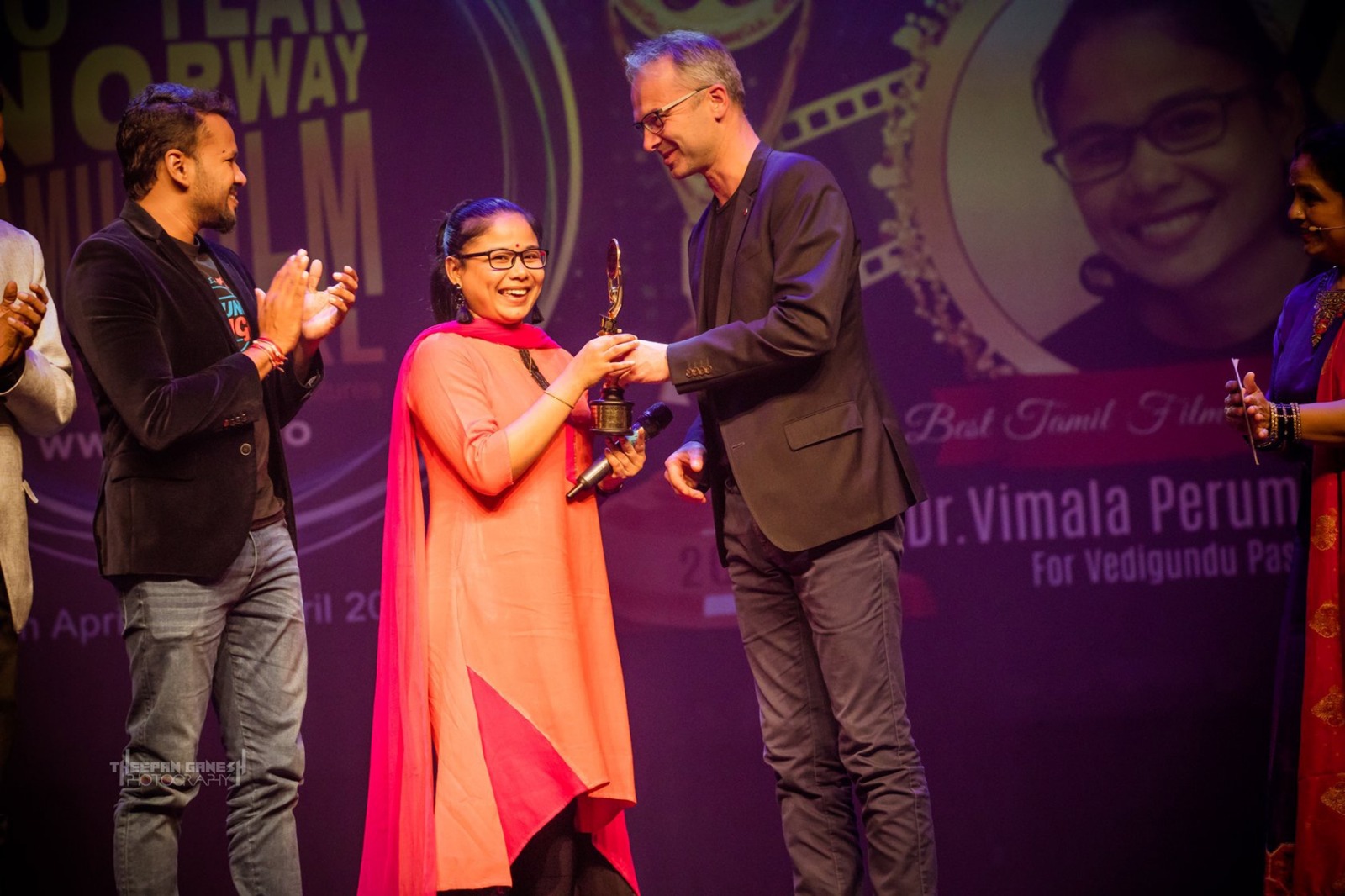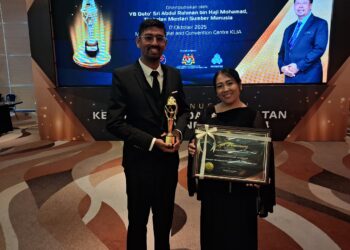In recent weeks, we have showcased esteemed directors such as JK Wicky, Saresh D7, and Karthik Shaamalan, delving into their insights on Malaysian Tamil cinema and its evolution. These directors have shared their perspectives and contributed to the advancement of the Malaysian Tamil cinema industry. In continuation of this series, we also had the opportunity to interview the renowned director and producer, Dr. Vimala Perumal, who has spearheaded several successful projects in the industry.
Vimala Perumal, a versatile filmmaker from Malaysia, holds roles as a director, producer, writer, and senior lecturer at Multimedia University Cyberjaya. She has made significant contributions to various publications, including books like “Tamil Film Industry in Malaysia” and journals such as “Human Communication: The Power Of Connection.” Throughout her career, she has been involved in numerous independent short films and feature films, earning widespread acclaim for her portrayal of Indian life in Malaysia.
Her directorial debut, a short film, competed at the esteemed 30th Busan International Short Film Festival in Korea. Dr. Vimala’s first full-length feature film, “Vilaiyaatu Pasange”, was a blockbuster in 2011. Following this, “Vetti Pasanga” marked her second feature film, achieving notable recognition with two Silver Awards at the international level. It also set records as the highest-grossing Malaysian Tamil movie under the Wajib Tayang Scheme upon its release in January 2014. Additionally, “Vetti Pasanga” made history as the first Malaysian Tamil movie to premiere on ASTRO First.
In 2020, Vimala Perumal’s third feature film, “Vedigundu Pasangge,” achieved a significant milestone by becoming the first Malaysian Tamil movie to surpass the 1 million collection mark. The film earned accolades, including the Best Film award at the Norway Tamil Film Festival and the Special Jury Award at the 30th Malaysian Film Festival.
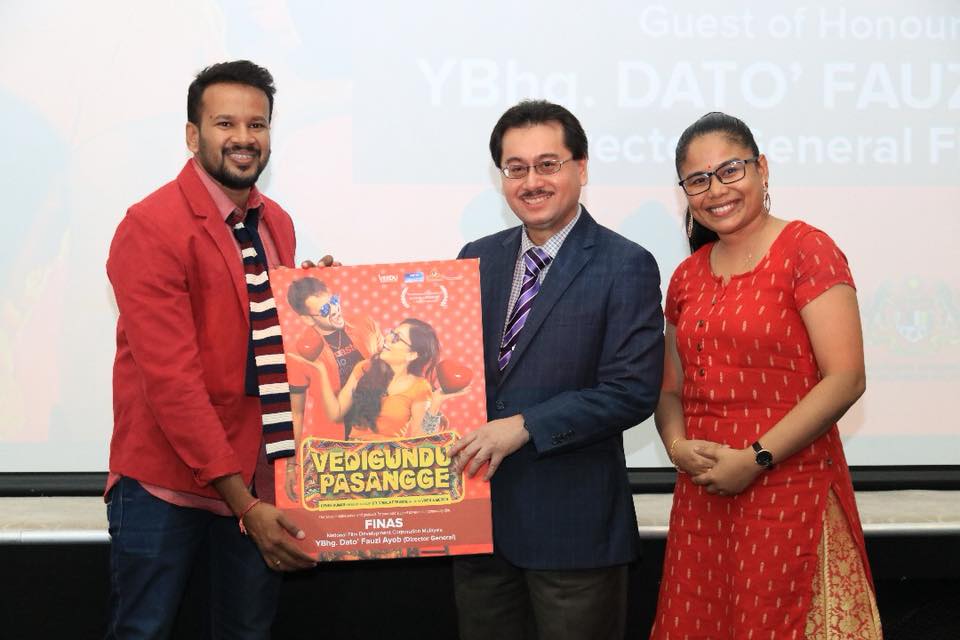
Diversifying her creative portfolio, Vimala ventured into television direction with her inaugural drama series, “Tamiletchumy,” in 2020. The series quickly made history by becoming the highest-rated television program ever aired in Malaysia. Building on this triumph, she went on to helm “Tamiletchumy Season 2” and contributed to several other series, including “Pasanga.”
Asking to describe herself in 3 words, she replied:
“Grateful, Optimistic and Cheerful”
This illustrates Vimala’s consistent gratitude and humility, qualities essential in the entertainment industry. Maintaining an optimistic mindset is imperative for everyone involved, from directors and producers behind the scenes to the artists on screen, given the industry’s inherent uncertainty. Malaysian Tamil cinema, in particular, is notorious for its unpredictability, where even renowned directors may experience setbacks in theatrical releases. Drawing audiences to local productions presents a significant challenge, compounded by the disparity in support compared to Kollywood films. Despite these obstacles, homegrown talents are dedicated to improving their craft and delivering exceptional projects. Encouraging their efforts is crucial for motivation and progress. An optimistic outlook enables them to gracefully accept feedback and persist in their creative endeavors, continually striving for excellence in future endeavors. By fostering a culture of encouragement and support, Vimala inspires others to persevere and excel in their endeavors, ensuring the continued growth and success of Malaysian Tamil cinema.
When asked about the challenges she faced as a female director along her journey, Vimala expressed that opportunities didn’t always come easily, but she learned to cherish the ones she earned and make the most of them. Despite the hurdles, she remained grounded, humbled by the support of those who believed in her and her vision. Throughout every trial and triumph, her greatest pillar has been her husband, the renowned actor Denes Kumar, who shared not only her vision but also her passion for storytelling. His presence served as a constant source of inspiration, reminding her that no challenge is insurmountable when faced with love and unity. In the face of adversity, Vimala always maintained the belief that every setback serve as a lesson, and every obstacle provide an opportunity for growth.
Balancing her professional aspirations with personal responsibilities proved to be a constant juggling act for Vimala. However, she drew strength from the stories she brought to life and the impact they had on audiences. Through it all, she held onto a deep-seated passion for storytelling, using it as a guiding light through the darkest of times. While her journey was challenging, it was also incredibly rewarding, filled with moments of joy and fulfillment. Vimala expressed gratitude for every obstacle faced, as they shaped her into the person and filmmaker she is today. As she continues on this path, she carries with her a sense of humility and gratitude, knowing that she stands on the shoulders of those who paved the way before her.
Vimala Perumal is also recognized as a prominent producer, managing Veedu Production, a renowned production company. The series and movies directed by Vimala Perumal fall under the banner of her own production company, Veedu Production.
When asked if she exclusively produces works directed by her or if she is open to producing other directors’ works, Vimala Perumal expressed her openness to collaborating with other talented directors. She emphasized the importance of collaboration in the film industry and her belief in supporting and championing the visions of fellow filmmakers. Vimala highlighted that if a project resonates with her and aligns with her values and artistic sensibilities, she would be more than willing to lend her expertise as a producer. This stance reflects her commitment to fostering a collaborative and inclusive environment within the filmmaking community, where diverse talents can come together to create impactful and meaningful works.
Elaborating on the challenges filmmakers face in finding a producer for their scripts, Vimala Perumal shared insights into the arduous journey directors undertake. She described it as a daunting task, fraught with the complexities of reconciling creative aspirations with financial realities. For directors, this quest is deeply personal, fueled by an unwavering belief in their story and a fervent desire to see it realized on screen. Yet, amid the excitement, uncertainty looms large, manifesting as fears of rejection and doubts about whether their vision will resonate with producers. Directors invest their hearts and souls into their scripts, each word reflecting their deepest hopes and aspirations. However, the path to securing a producer is fraught with challenges, including fierce competition, the relentless pursuit of commercial success, and the inevitable compromises that accompany it. Despite these obstacles, directors persevere, driven by their passion for storytelling and conviction in the transformative power of cinema.
For filmmakers, finding a producer transcends mere funding; it’s about discovering a kindred spirit, a collaborator who shares their vision and belief in the magic of storytelling. When this partnership is finally forged, it signifies a triumph—a validation of talent, resilience, and a beacon of hope that their story will grace the silver screen. Despite the hurdles, many directors navigate through by staying true to their vision, persevering through challenges, and cultivating strong relationships within the industry. However, they also recognize that compromise is often an inevitable aspect of the filmmaking journey, as no cinema is devoid of compromise.
In the film industry, numerous directors possess vision and compelling scripts, yet lack the necessary funding for production. Bringing a script to life through filming is a formidable task, with finances playing a crucial role in its realization. While some directors may have the means to fund a single project, sustaining this approach for every film becomes impractical. Consequently, this financial hurdle often impedes directors from bringing their stories to fruition.
Many criticize Malaysian filmmakers for their alleged lack of marketing skills and inability to promote their films effectively, resulting in their movies failing to reach a wider audience. However in reality, many filmmakers and their crews encounter substantial difficulties even in the initial stages of production. The process of filming a movie demands significant financial resources, from securing locations and equipment to paying cast and crew members. As a result, filmmakers often find themselves stretched thin financially, with limited resources available for marketing and promotion efforts. This broader context highlights the multifaceted nature of the challenges faced by Malaysian filmmakers, encompassing both production and promotion aspects of filmmaking.
Marketing also requires a significant financial investment. Printing banners to be displayed across various locations, distributing thousands of pamphlets, and producing promotional merchandise such as t-shirts all incur substantial costs. However, despite these efforts, success at the box office is not guaranteed, and many films with compelling narratives fail to perform as expected. Therefore, it’s not that the filmmakers lack knowledge of how to promote their films or are negligent about marketing; rather, the main issue lies in the insufficient funds available for marketing efforts. Filmmakers often invest all they have into the production of their films, leaving little room for extensive marketing campaigns. As a result, some movies end up with minimal marketing efforts, which ultimately affects their performance in the market. There are a few exceptional creations that have made a lasting impact on audiences but failed to generate profits compared to the production costs due to inadequate marketing. These films truly deserved greater recognition for their quality and compelling narratives.
This poses as one of the paramount challenges that filmmakers encounter, significantly influencing the outcome of their films. Producers like Vimala Perumal, who are open to supporting the worthy works of other directors, can be instrumental for numerous filmmakers in the industry. Such openness fosters the potential for the emergence of more outstanding creations within the Malaysian Tamil cinema sphere. Vimala’s willingness to engage in collaborative endeavors is commendable and holds the potential to catalyze substantial advancements and development within the Malaysian Tamil cinema sector.
When developing a script, how do you balance artistic creativity with audience appeal to create a film that resonates with viewers on multiple levels?
When it comes to developing a script, balancing artistic creativity with audience appeal is like navigating a delicate tightrope, but it’s the very essence of my journey in filmmaking. At the heart of every project lies a profound story that touches on universal emotions and human experiences. Injecting this narrative with my artistic vision, be it through captivating visuals or intricate storytelling techniques, is where the true magic unfolds. However, I’m also acutely aware of the importance of understanding my audience—their desires, aspirations, and cultural background. My goal is to convey the essence of each film in a language that speaks directly to the hearts of viewers, enabling them to both feel and understand its significance. It’s an ongoing exploration, a journey of discovery, where each film becomes a dialogue between artistic expression and audience connection. I’m reminded of a poignant statement by the late Yasmin Ahmad that resonates deeply with me:
“If you tell the story from the heart, it will definitely reach the people’s heart.”
This sentiment guides me, urging me to infuse authenticity and sincerity into every project to ensure it resonates profoundly with audiences.
Her response underscores a deep commitment to authenticity, sincerity, and the profound impact of storytelling in the filmmaking process. It highlights the director’s prioritization of storytelling to ensure resonance with viewers. Filmmakers prioritize understanding the audience’s perspective and strive to deliver their best work. Encouraging exploration and support for Malaysian Tamil films is vital, despite inevitable flaws as part of the learning process. Providing constructive feedback allows filmmakers to improve and excel in subsequent projects. This approach mirrors the growth trajectory of the Kollywood industry, which has evolved into an incomparable giant through continuous refinement and adaptation.
What feedback did you receive from audiences in India when your film, “Vedigundu Pasangge,” was screened there, and how did the recognition motivate you?
It was truly heartening and enlightening. Many viewers expressed a genuine sense of surprise and joy upon discovering the multifaceted beauty of Malaysia portrayed in the film. It was touching to hear that, while some had previously associated Malaysia primarily with iconic landmarks like KLCC and bustling city life, they were
delighted to experience the film’s depiction of our lesser-known yet equally captivating facets. In particular, audiences were captivated by the unique portrayal of Malaysian culture, including the use of certain Malay words and phrases in the dialogue. They found this linguistic uniqueness to be charming and endearing, adding an extra layer of authenticity to the storytelling. This positive reception reinforced my belief in the importance of showcasing the rich cultural landscape of Malaysia on the global stage. The recognition of these overlooked aspects of Malaysian life served as a poignant reminder of the power of storytelling to humanize and unite us across cultures. It reinforced my belief in the importance of celebrating our cultural diversity and showcasing the unique nuances that make each of us who we are. It’s moments like these that reaffirm my passion for filmmaking and drive me to continue sharing stories that resonate with audiences on a deeply human level.
“Vedigundu Pasangge” is a Malaysian Tamil film helmed by director Vimala Perumal. It boasts an ensemble cast including Denes Kumar, Sangeetha Krishnasamy, David Anthony, Alvin Martin, the late legendary actor Thangamani, and many others. The music and background score were composed by the duo Vivek and Mervin. This film received a warm reception from audiences and was screened on global stages including Singapore, Sri Lanka, and Tamil Nadu. The positive feedback and international audience engagement underscore the potential of Malaysian Tamil cinema, showcasing its ability to create impactful works with the potential to make waves on international platforms.
This highlights the significance of establishing a unique identity for Malaysian Tamil films, distinct from the style and feel of Kollywood productions. It emphasizes the importance of infusing Malaysian elements into filmmaking to create a sense of authenticity and local flavor. By showcasing stories that resonate with Malaysian audiences and portraying cultural nuances specific to the region, filmmakers can captivate viewers and draw them into the Malaysian cinematic experience. This approach not only fosters a sense of pride in local filmmaking but also sparks curiosity and interest among audiences, encouraging them to explore and support homegrown creations. Ultimately, creating a distinct identity for Malaysian Tamil cinema enhances its appeal and contributes to the growth and recognition of the industry both locally and internationally.

When asked about cultivating interest in local Tamil films, Vimala emphasized the importance of storytelling that strikes a chord with audiences’ emotions and experiences. She expressed that each film serves as more than mere entertainment—it’s a reflection of collective hopes, dreams, and struggles. Filmmakers invest their souls into every aspect of production, believing in the transformative power of stories to inspire and unite.
According to Vimala, storytelling extends beyond the script to encompass the collaborative efforts of talented creators behind the scenes. From the director shaping the vision to the crew working tirelessly behind the scenes, each individual plays a vital role in bringing narratives to life, crafting rich emotional experiences that transport audiences on captivating journeys. While protagonists take center stage, Vimala also acknowledged the contributions of unsung heroes like cinematographers, music directors, sound engineers and editors, who infuse beauty and meaning into every frame. In the end, it’s the combined efforts of these passionate storytellers that breathe life into our films and captivate the hearts of audiences far and wide.
In her view, the synergy between compelling content and creative execution is paramount. Vimala emphasized the inseparable bond between content—the king—and creation—the queen—in shaping the filmmaking process. Together, they guide filmmakers in producing works that resonate deeply with audiences, leaving a lasting impression long after the final credits roll.
Vimala Perumal’s insights offer valuable guidance for enhancing the Malaysian Tamil Cinema industry. They shed light on the filmmakers’ journey and the challenges they face in bringing a film to completion. Previously, we conducted interviews with three other directors, JK Wicky, Saresh, and Karthik Shaamalan, as part of this project. Each interview delved into different aspects of the Malaysian Tamil cinema industry, providing a comprehensive view from the inception of a film to the journey of its directors, audience feedback, and the importance of recognition.
The aim of these interviews was to provide a clear and insightful perspective on the Malaysian Tamil cinema industry. There are many directors and artists who are striving to showcase their talents. These individuals deserve recognition for their efforts, as encouragement and acknowledgment are essential fuels for everyone in the entertainment industry.
Ignorance, stereotypes, or assumptions about Malaysian Tamil films without actually watching them can undermine the efforts and aspirations of many individuals. While it’s natural for there to be shortcomings in some works, addressing these shortcomings constructively provides filmmakers with the opportunity to learn and improve. Rather than unfairly criticizing or labeling all Malaysian Tamil films, it’s more productive to identify areas for growth and encourage filmmakers to strive for excellence in their future projects.
Many Malaysian Tamil films have been garnering positive reception from audiences and making waves in recent times. Through collective understanding and collaborative efforts, the Malaysian Tamil cinema industry can continue to ascend to greater heights. By supporting and appreciating the diverse talents and narratives within the industry, we can contribute to its continued growth and success.
This is a Varnam Exclusive Feature! Reproduction requires a credit to Varnam Malaysia.
Follow us on Instagram, Facebook or Telegram for more updates and breaking news.





